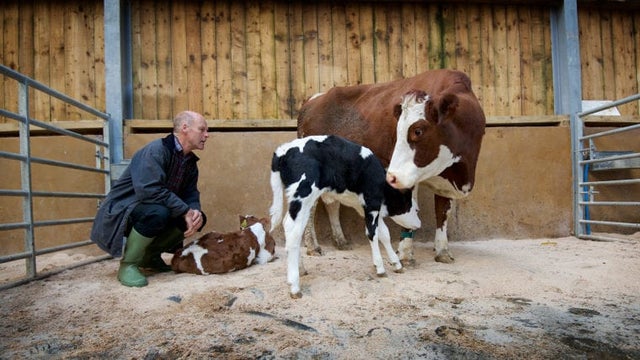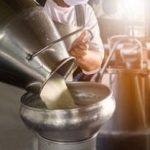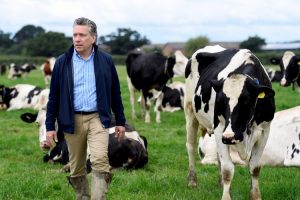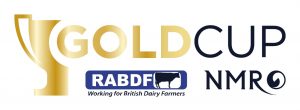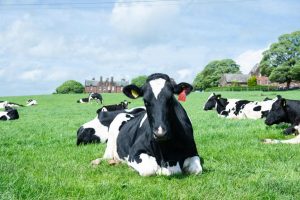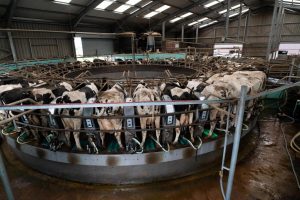
Who could have imagined a decade ago that the politics of dairy farming would be discussed in an Oscars’ acceptance speech?
As a dairy farmer I actually agree with Joaquin Phoenix’s comments that people have become disconnected from the natural world, but his call to switch to completely plant-based has environmental and nutritional consequences, so I believe we have to strike a balance.
As interest in veganism surges it’s easy for livestock farmers like me to get defensive, but building walls between polarised points of view will achieve nothing. There are no simple solutions to sustainably feeding our population in a climate conscious way, which is why sharing ideas, points of view and experiences is so important.
When we – a dairy farm – announced a tour we are organising specifically for vegans, it raised a few eyebrows, but it shouldn’t. We want to break down barriers and recognise that there are many different reasons why people make the dietary choices they do. As producers of food we welcome the learning that comes from listening to those with other points of view.
Twenty years ago we started regularly opening our farm to the public. We were proud of our organic dairy farm and happy to show people round. However, when we got to the calf shed part of the tour it became clear that standard farming practice was very different from what people want and expect.
In almost every dairy farm in the world, calves are separated from their mum within a few hours of birth. This is how dairy farms have been run for decades because to get milk in the tank you need to take the calf away – it’s obvious isn’t it? Clearly it wasn’t obvious at all. Our visitors asked us challenging questions about why we separated the calves, which caused us to wonder what would happen if we didn’t.
Leaving the calf with its mum sounds like a simple change, but it completely alters the production system. No one had made cow-with-calf dairy farming work at a commercial scale before, such as our traditional, tenanted, family farm size. Dairy farmers will naturally pick holes in this approach, because if someone can demonstrate that cow-with-calf can work, even at a modest scale, then the pressure will be on for others to follow.
In 2005 we began the long journey towards it, keeping the cows and calves together. We built a brand new dairy so the calves could stay with their mum, and we redesigned our entire milking system. We ran a pilot in 2012 which taught us a great deal, but nearly bankrupted us. Bruised but not beaten we remodelled the system, re-financed and in late 2016 gave ourselves a three year deadline to either prove cow-with-calf could work, or to quit.
Last November our three years were up and we announced to the industry, with absolute certainty, that this system does indeed work. It works for the cows who have a marked reduction in stress, improvement in health and higher than expected levels of productivity. It works for the calves who thrive being reared by their mothers, growing twice as quickly as before. It also works for us and the farm staff, with reduced costs and a highly motivated farm team.
Our cow-with-calf dairy farming system is very different to a conventional dairy farm. The most obvious difference is that the calves stay with their mum for around five months – the male calves too. During this time we milk the herd only once a day and the cows and calves are out on organic pasture as much as possible.
The calves are drinking about a third of the milk, but they thrive within this system, growing twice as fast as before. What we lose in milk volume is balanced against improved health and reduced inputs, like feed, labour and antibiotics.
We have been surprised to find that around a fifth of our customers are themselves vegan, often mums seeking out high welfare dairy for their children and partners. When we ran a crowdfunder to help fund the expansion we were inundated with comments and emails of support and thanks from people, mainly women, who expressed deep gratitude that we have created a dairy system they are comfortable with.
Comments such as: “Your cheese is the only concession I make to my otherwise vegan diet, and it’s the only cheese I buy for my family”, “I’ve tried veganism but I love cheese too much and this concept would make me feel a little bit better” and “Love what you are doing and I am vegan but my son is not so to find places that I can back and believe in is amazing”, filled our inboxes.
‘Vegan activism is right to bring bad practice in the farming industry to public attention.’
In contrast, the strength of the criticism, from both the conventional dairy industry and vegan fundamentalists, has been staggering in its anger. We recently had to introduce language moderation to our Facebook page to protect our team and our page followers from being exposed to violent and aggressive comments.
Yes, we are trying to start a dairy farming revolution from one wee farm in south west Scotland, but the surge in veganism proves that change in this industry is long overdue. There are many, many people following plant-based diets who are opposed to conventional dairy farming practices, but not necessarily opposed to dairy produce itself; people for whom the method of production really matters. These are the people we expect to take part in our vegan farm tour.
Vegan activism is right to bring bad practice in the farming industry to public attention and it is up to the industry to get its house in order. We want to play our part by explaining why we think there is still a place for livestock farming, by demonstrating how ruminants on the land can deliver positive environmental benefits and by showing that there is a viable alternative to intensive dairy farming.
In simple terms what we are doing here is de-intensifying dairy farming. We are working with nature and with the animals’ natural instincts to create an ecological, grass-based farming system, producing highly nutritious food with a positive environmental impact. Our farm tours are designed to explain that approach, and it does take a bit of explanation.
Our experience of human technological intervention is that it often delivers short term benefits but at some considerable societal cost further down the line. Nature got us to where we are with millennia of trial and error and the least harmful systems are those based around nature; and so it is with food production. Those complex interactions of symbiotic microbes, plants and livestock throughout our food system can’t be replaced by technology. What we’re doing on this farm is simply helping nature do its job.
While our typical farm tour includes discussion of food production and samples of our cheese, our new vegan farm tour will not. Instead it will focus on the fairly complex environmental issues around livestock farming, and on animal welfare and sentience. The intention is to create a safe space where people with concerns about farming can ask frank questions directly to the farm team. It’s not about converting people to our cause, it’s simply about dialogue.
It is our experience that talking with people from outside our bubble challenges our assumptions and provokes us into doing better. Questions from visitors to our farm 20 years ago are what nudged us on the path to cow-with-calf dairy farming. I have no doubt that the questions from our vegan visitors in May will be illuminating and thought provoking too.
David Finlay is an organic dairy farmer and owner of The Ethical Dairy
